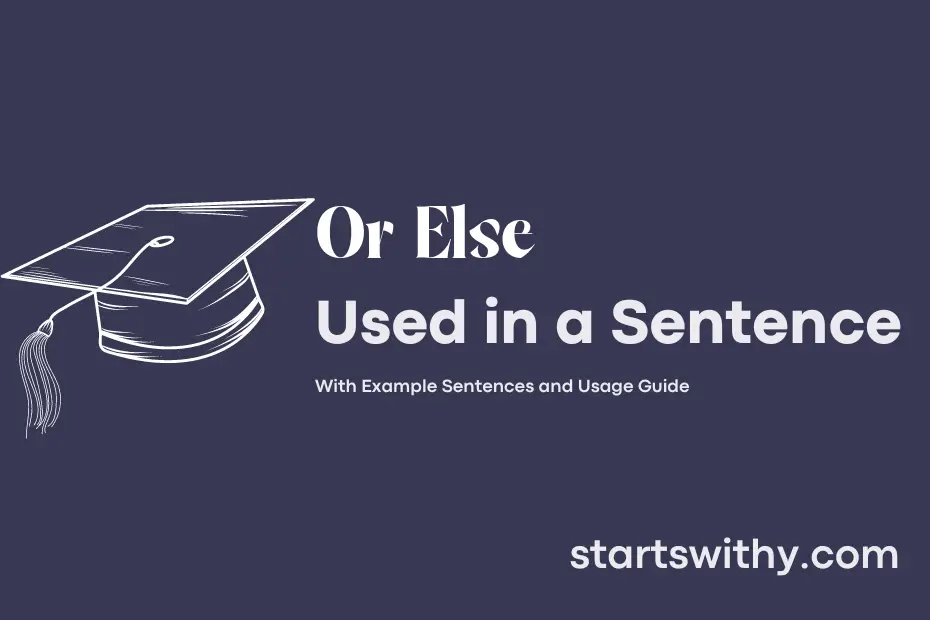Have you ever encountered a situation where you had to make a decision between two options with consequences? This is called a dilemma, where you must choose between one action or another, or else face the repercussions.
An example sentence using “or else” clearly shows the choice that must be made and the potential outcome that will occur if the alternative option is not chosen. This phrase emphasizes the importance of weighing the consequences and making a decision between the presented options.
7 Examples Of Or Else Used In a Sentence For Kids
- Eat your vegetables, or else you won’t grow big and strong.
- Finish your homework, or else you won’t be able to play outside.
- Say sorry when you make a mistake, or else your friend might be sad.
- Listen to your teacher, or else you might miss the fun activities.
- Brush your teeth before bed, or else your teeth might get cavities.
- Clean up your toys, or else someone might trip and fall.
- Wear your jacket when it’s cold, or else you might get sick.
14 Sentences with Or Else Examples
- Submit your assignment on time, or else you will lose marks.
- Make sure to attend all your classes, or else you might miss important information.
- Study for your exams, or else you won’t be able to pass.
- Apply for internships early, or else you might miss out on good opportunities.
- Manage your time effectively, or else you will feel overwhelmed with academic pressure.
- Stay focused during lectures, or else you might not understand the concepts later.
- Use reliable sources for your research, or else your work might be considered plagiarism.
- Check your email regularly, or else you might miss important notifications from your professors.
- Practice good hygiene in shared spaces, or else you might fall sick.
- Attend career fairs, or else you might miss potential job offers.
- Back up your important files, or else you risk losing all your data.
- Respect deadlines for project submissions, or else you might face penalties.
- Participate in extracurricular activities, or else you might miss out on personal growth opportunities.
- Network with professionals in your field, or else you might struggle to find job opportunities after graduation.
How To Use Or Else in Sentences?
Or Else is used to show the consequence or alternative to a particular action or situation.
When using Or Else in a sentence, consider the following guidelines:
-
Placement: Or Else is typically used at the end of a sentence or phrase. For example, “Finish your homework now, or else you will not be able to play video games later.”
-
Consequence: Or Else is used to indicate what will happen if a certain action is not taken. For instance, “Clean your room, or else you will not get your allowance.”
-
Alternatives: Or Else can also suggest an alternative action. For example, “You should study for your exam, or else you may fail.”
-
Tone: Depending on the tone of the sentence, Or Else can convey a sense of warning, urgency, or seriousness.
-
Punctuation: Or Else is often followed by a comma to separate it from the rest of the sentence.
Remember, when using Or Else in a sentence, make sure it is clear and concise to communicate the intended consequence or alternative effectively. Practice incorporating Or Else in your daily conversations to become more comfortable with its usage.
Conclusion
In conclusion, sentences with “or else” serve to communicate consequences or alternatives that may occur if a certain action is not taken. These phrases are used to emphasize possible outcomes, urging individuals to consider the repercussions of their choices. By incorporating “or else” into sentences, speakers or writers aim to highlight the importance of making a decision or following through with a specific course of action to avoid undesirable consequences.
Whether used in warnings, ultimatums, or suggestions, sentences with “or else” are straightforward and impactful in conveying the message that there are potential outcomes that can result from a particular situation. This linguistic tool serves as a powerful way to emphasize the significance of decisions and actions, guiding individuals towards making informed choices to avoid negative repercussions.



